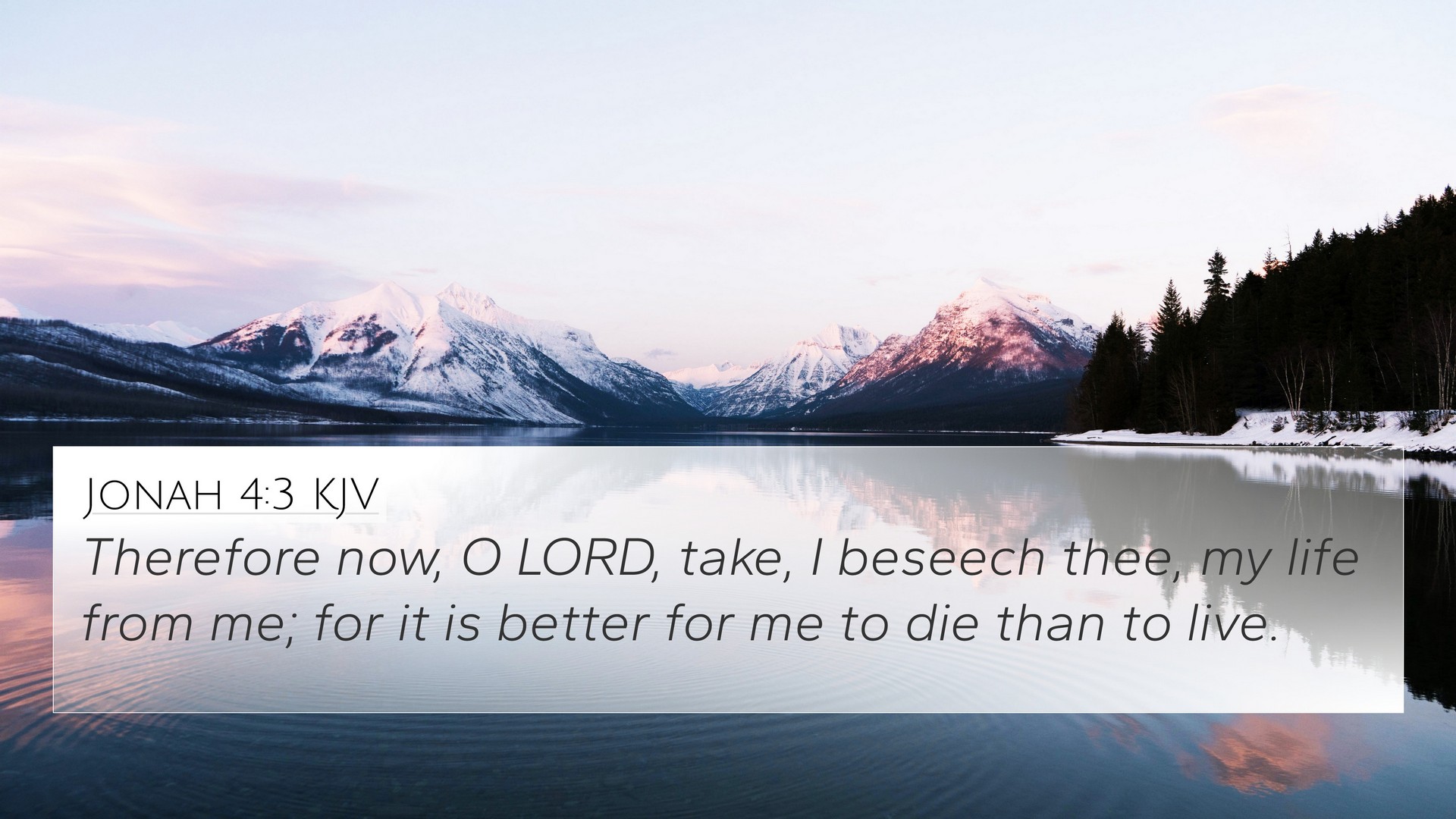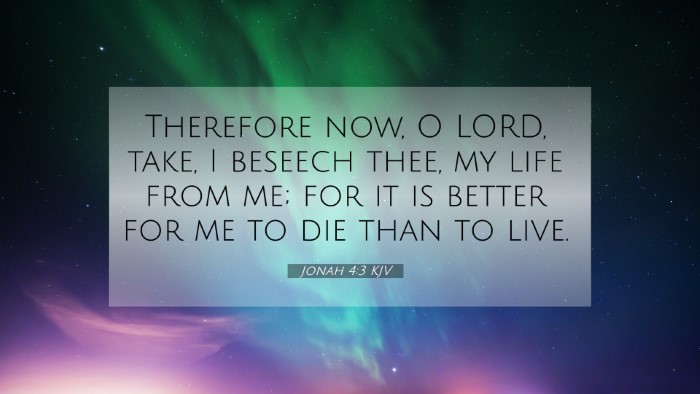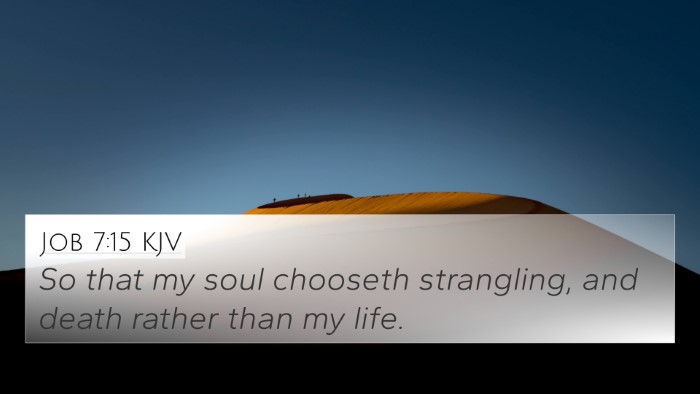Old Testament
Genesis Exodus Leviticus Numbers Deuteronomy Joshua Judges Ruth 1 Samuel 2 Samuel 1 Kings 2 Kings 1 Chronicles 2 Chronicles Ezra Nehemiah Esther Job Psalms Proverbs Ecclesiastes Song of Solomon Isaiah Jeremiah Lamentations Ezekiel Daniel Hosea Joel Amos Obadiah Jonah Micah Nahum Habakkuk Zephaniah Haggai Zechariah MalachiJonah 4:3 Similar Verses
Jonah 4:3 Cross References
Therefore now, O LORD, take, I beseech thee, my life from me; for it is better for me to die than to live.
Uncover the Rich Themes and Topics of This Bible Verse
Listed below are the Bible themes associated with Jonah 4:3. We invite you to explore each theme to gain deeper insights into the Scriptures.
Jonah 4:3 Cross Reference Verses
This section features a detailed cross-reference designed to enrich your understanding of the Scriptures. Below, you will find carefully selected verses that echo the themes and teachings related to Jonah 4:3 KJV. Click on any image to explore detailed analyses of related Bible verses and uncover deeper theological insights.
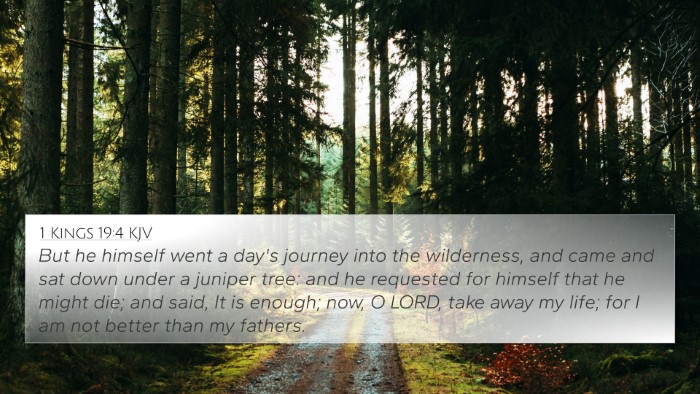
1 Kings 19:4 (KJV) »
But he himself went a day's journey into the wilderness, and came and sat down under a juniper tree: and he requested for himself that he might die; and said, It is enough; now, O LORD, take away my life; for I am not better than my fathers.

Ecclesiastes 7:1 (KJV) »
A good name is better than precious ointment; and the day of death than the day of one's birth.
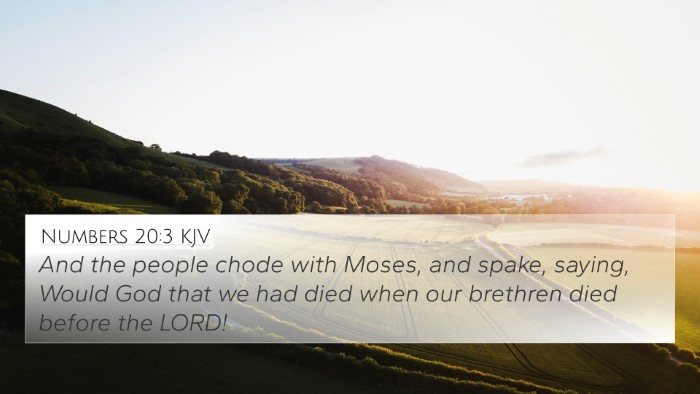
Numbers 20:3 (KJV) »
And the people chode with Moses, and spake, saying, Would God that we had died when our brethren died before the LORD!
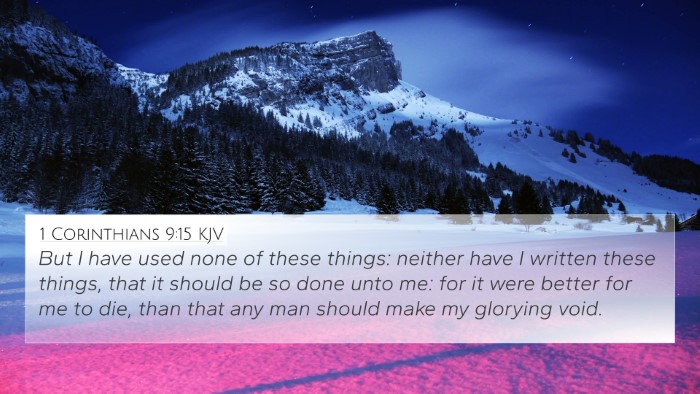
1 Corinthians 9:15 (KJV) »
But I have used none of these things: neither have I written these things, that it should be so done unto me: for it were better for me to die, than that any man should make my glorying void.
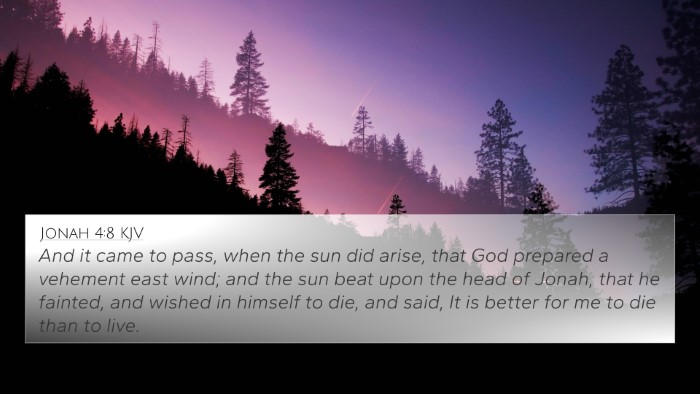
Jonah 4:8 (KJV) »
And it came to pass, when the sun did arise, that God prepared a vehement east wind; and the sun beat upon the head of Jonah, that he fainted, and wished in himself to die, and said, It is better for me to die than to live.
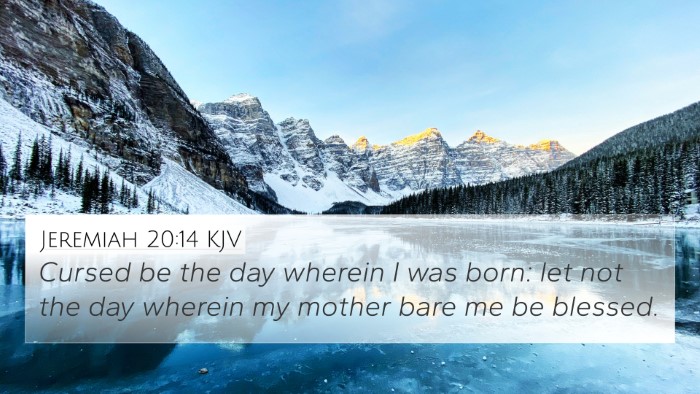
Jeremiah 20:14 (KJV) »
Cursed be the day wherein I was born: let not the day wherein my mother bare me be blessed.

Job 6:8 (KJV) »
Oh that I might have my request; and that God would grant me the thing that I long for!
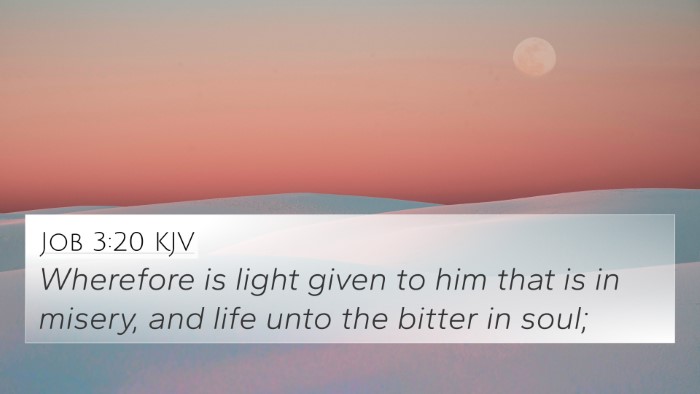
Job 3:20 (KJV) »
Wherefore is light given to him that is in misery, and life unto the bitter in soul;
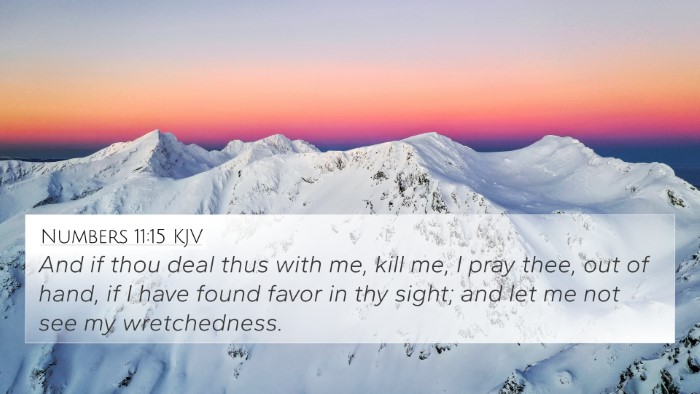
Numbers 11:15 (KJV) »
And if thou deal thus with me, kill me, I pray thee, out of hand, if I have found favor in thy sight; and let me not see my wretchedness.
Jonah 4:3 Verse Analysis and Similar Verses
Understanding Jonah 4:3
Jonah 4:3 captures a profound moment in the life of the prophet Jonah, expressing his intense frustration and desire to escape his call from God. The verse states, "Therefore now, O Lord, take, I beseech thee, my life from me; for it is better for me to die than to live." This plea highlights several key themes present in the narrative, including disobedience, divine mercy, and the struggle between personal desire and divine purpose.
Summary of Insights
The following insights drawn from public domain commentaries provide a comprehensive understanding of Jonah 4:3:
-
Matthew Henry's Commentary:
Henry emphasizes Jonah's unwillingness to accept God’s mercy offered to Nineveh, showcasing a conflict between God's grace and Jonah's personal wrath. He interprets Jonah's desire to die as indicative of his despair and self-centeredness, highlighting the inner turmoil experienced when one's personal desires clash with God’s will.
-
Albert Barnes' Notes:
Barnes notes Jonah’s misplaced priorities, illustrating that Jonah values his own life more than the well-being of countless souls in Nineveh. This stark contrast illustrates a recurring theme in the Bible: the tension between human emotions and divine purposes, calling readers to reflect on their own response to God's commands.
-
Adam Clarke's Commentary:
Clarke elaborates on Jonah’s mental state, viewing his request as an extreme reaction to disappointment. He suggests that Jonah believed his prophetic mission was a failure, as he anticipated destruction instead of repentance. This commentary provides deeper psychological insights into Jonah's character and his struggle with God’s decisions.
Related Themes and Cross-References
Jonah 4:3 has several biblical connections that reflect the overarching message of the scriptures regarding God’s mercy and human frailty. The following verses serve as significant cross-references:
- Luke 9:54-55: Jesus rebukes His disciples for wishing destruction upon Samaritans, paralleling Jonah’s attitude toward Nineveh.
- 2 Peter 3:9: God’s desire for all to come to repentance reflects the mercy Jonah was initially opposed to.
- Matthew 5:44: Jesus instructs to love even the enemies, which Jonah struggles to embody when faced with Nineveh's repentance.
- Exodus 32:32-33: Moses' intercession for the Israelites mirrors Jonah's desire for his own death instead of the people’s forgiveness.
- Proverbs 14:12: This verse speaks to the folly of human judgment, as Jonah believed he had the right to decide who deserved God's mercy.
- Jeremiah 20:14-18: The despair of the prophet Jeremiah complements Jonah's wish to die amidst disappointment in his prophetic mission.
- Romans 9:2-3: Paul expresses similar anguish for Israel, showing a prophetic heart burdened by the fate of others.
- 1 Kings 19:4: Elijah's desire for death in despair creates a thematic link between prophets experiencing existential crises after their missions.
- Galatians 1:10: Paul discusses the dilemma of seeking approval from men versus God, a struggle reflective of Jonah's conflict.
- Psalms 139:7-10: This emphasizes God’s omnipresence, reminding us that fleeing from God’s presence, like Jonah, is futile.
Conclusions
Jonah 4:3 serves as a powerful reminder of the conflict between divine will and human emotion. The commentaries illuminate Jonah’s struggles with disappointment and pride, while cross-references enrich our understanding of prophetic dynamics throughout the Bible. It invites believers to reflect on their responses to God's calling and consider the vastness of His mercy towards others, aligning with the overarching message of grace found throughout Scripture.
Tools for Deeper Study
For those interested in exploring Bible verse cross-references further, consider utilizing tools such as:
- Bible concordances for locational reference of themes and verses.
- Bible cross-reference guides that simplify connections.
- Cross-reference Bible study methods that categorize verses by themes.
- Comprehensive Bible cross-reference materials for a thorough understanding.
- Online resources for navigating Bible themes and their interrelations.
